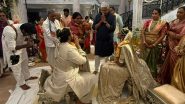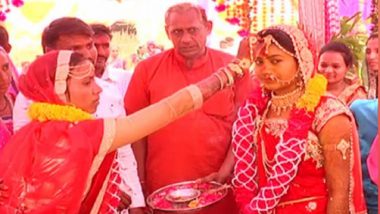Chhota Udepur, May 26: Tribals in villages here follow an unusual tradition- marriages take place without the groom's physical presence. A groom cannot attend his own wedding and his unmarried sister or any unmarried woman from his family should represent him in the ceremonies as the groom. The groom stays at his own home with his mother, while his sister leads the 'barat' (wedding procession) to the bride's door, marries her and brings her back.
"All the rituals that a groom traditionally does is conducted by his sister. She takes the 'mangal phere' with the bride instead of her brother," says Kanjibhai Rathwa, local resident, Surkheda village. "This practice is followed in three villages here; it is believed that if we don't follow this custom then some harm will befall," Rathwa says. Ramsingbhai Rathwa, the village head of Surkedha village in the district says that whenever people disregarded the practice, they unfortunate events befell them." Taiwan Celebrates Same-Sex Marriage! Watch Video of Gay and Lesbian Couples Happily Exchanging Marital Vows.
A couple of times some people have tried to not follow the tradition and it is seen that either they end up with broken marriages or their family life does not get well or several other types of problems also arise," he says. The groom, although he dresses up in 'sherwani', wears a 'safa' on his head and carries a traditional sword, however, cannot attend his own wedding.
Pundits say this unique tradition reflects the tribal culture, is part of their folklore had been followed by the tribes since time immemorial. According to the folklore, the male deities of the three villages Surkheda, Sanada and Ambal where this custom is followed were bachelors and the villagers in order to show them respect keep their grooms at home, doing so they believe will protect their grooms from harm.
(This is an unedited and auto-generated story from Syndicated News feed, LatestLY Staff may not have modified or edited the content body)













 Quickly
Quickly




















